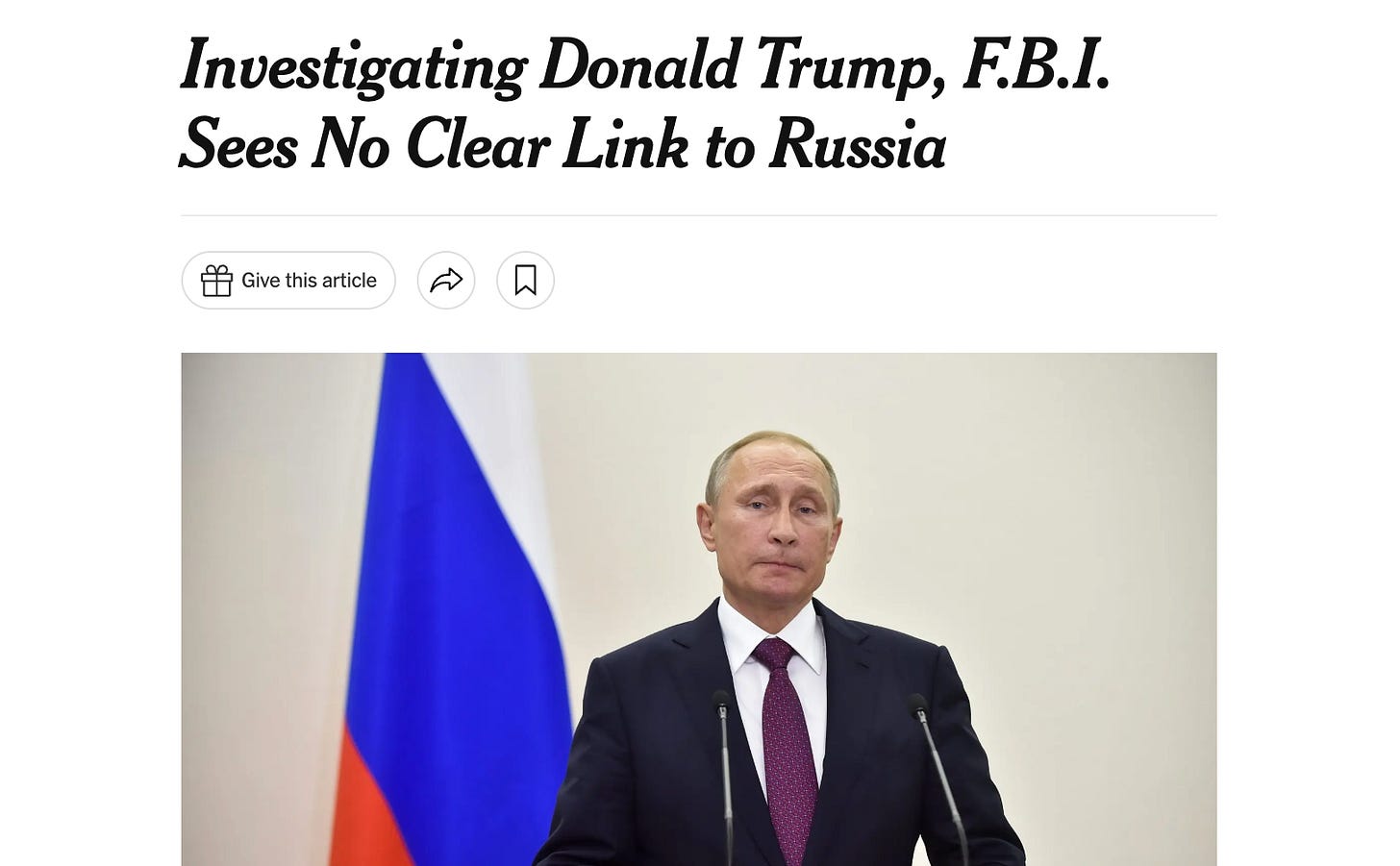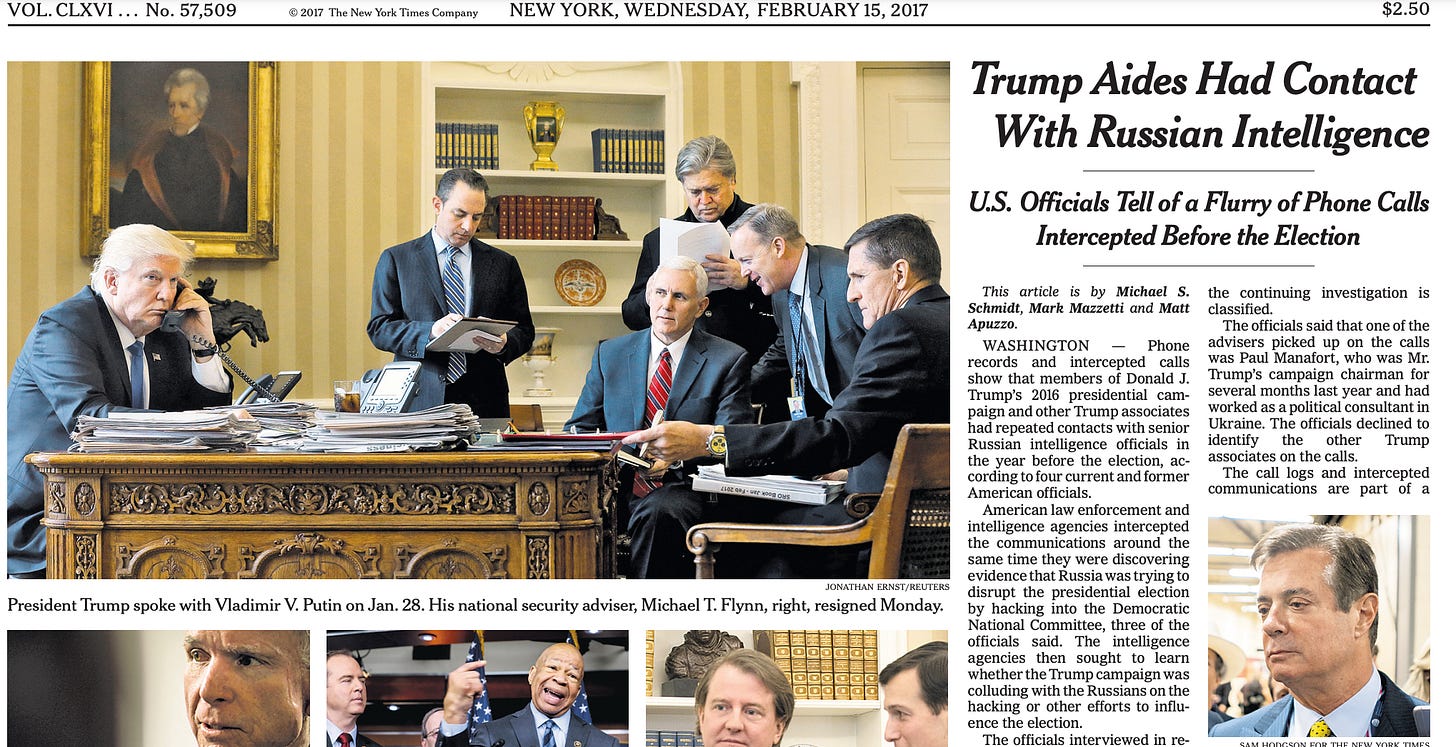The first half of Jeff Gerth’s four part CJR series “The press versus the president”, begins with the first credible suggestions that Donald Trump and Vladimir Putin may have been in cahoots and ends with FBI Director James Comey getting the ol’ heave ho.
See, I saved you 11,900 words.
There’s more than just that of course. The series bring you Gerth’s interviews, excavations, and examinations of court filings. He spends the vast majority of the series chronicling major print piece and noting the walk-backs, corrections, and reframings of those very stories, often within the same publications that originally published them. However, CPJ never links to the stories, nor do they offer an easy-to-follow guide. This is my attempt to do so, should you care, which you should because these stories came to define a presidency and the institution which that president so despised.
While much of the reporting and reaction to allegations of Donald Trump’s Russia connections were refracted through the Steele Dossier that document, while central to Gerth’s story has been throughly vetted elsewhere. In this run down, I’ll sidestep most of the Steele-specific content. If you long for that sort of thing it can be found in such documents as the Department of Justice Inspector General Report. The IG report is the definitive assessment of the entire Crossfire Hurricane investigation and the dossier, mentioning Steele 2,540 times, thus taking the idea of Steele-manning an argument to ridiculous lengths and possibly contributing to supply chain issues which kept you from acquiring the back-ordered Ford Bronco .
With that in mind, here are the important stories that defined Trump-Russia Gate, as highlighted by Jeff Gerth and the Columbia Journalism Review.
This is part of what will be an ongoing feature of Pesca Profundities:
AIRSUCS
Articles I Read So You Can Skip.
Enjoy?
Was it Impactful?: Yes, it wasn’t new or unique but was among the earliest attempts to flesh out the relationship that would form the basis of Crossfire Hurricane.
Was it Accurate?: Seems entirely accurate, except for one editor’s note clarifying a minor detail.
Status Today: It’s solid.
Fun Fact: Cameo from Carter Page, “a Trump foreign policy adviser (who) once ran the Moscow office of Merrill Lynch” soon to be the lynchpin of another report.
Was it Impactful?: A bit. Trump staffers removed from the GOP platform a Ted Cruz-backed initiative calling for the arming of Ukraine. This fact was cited by other pundits as a data point in arguing that Trump was doing Russia’s bidding.
Was it Accurate?: Not untruthful, but the conclusion, that there was a nefarious explanation does not seem to be the best one. Eliminating a call to arms in the official party platform was an accurate expression of Trump (and the Obama administration) policy preferences.
Status Today: Still cited as evidence of Trump’s subservience to Putin despite better explanations.
Fan Fact: Diana Denman, the Cruz delegate who fought for a commitment to arming the Ukrianians was chair of the Peace Corps under Ronald Reagan
Was it Impactful?: Yes, Manafort was out by the end of the week
Was it Accurate?: Yes
Status Today: It was fodder for the Clinton campaign and Senator Harry Reid to urge FBI involvement
Fun Fact: Article states “It is unclear if Mr. Manafort’s activities necessitated registering.” - This was among the crimes he was convicted of two years and one week after this story ran
Was it Impactful?: As the headline indicates it downplayed what other outlets had hyped, an investigation into the Trump-Russia dealings, but also a connection between the Trump campaign and a Russian bank, Alfa-Bank. Ultimately the best explanation for the Trump Russia Bank connection is a benign one though some journalists, including the bylined Eric Lichtblau continue to believe otherwise.
Was it Accurate?: The article didn’t disclose until the 10th paragraph what then-Times editor Dean Baquet and the paper would come to view as the real news, that the F.B.I. had opened a broad investigation into possible links between the Russian government and the Trump campaign. Two years later Baquet said that while not inaccurate “the headline was off”.
Status Today: Still cited as a sign that the Times downplayed the real FBI-Investigates-Candidate story of the 2016 election. Times-critics on the left like Matt Taibbi and Glenn Greenwald will allege that during the Trump administration the Times tried so badly to make up for the misdeed of downplaying the Trump-Russia connection that they overcorrected.
Fun Fact: This story ran on page A20, on page A19 was this headline:
Then came election day:
Then you remember this:
The next big shoe to drop in the CPJ timeline is:
Was it Impactful?: Yes, but the impact wasn’t on the soon-to-be-exiting Obama administration. It was contained closer to the end of the column :
According to a senior U.S. government official, Flynn phoned Russian Ambassador Sergey Kislyak several times on Dec. 29, the day the Obama administration announced the expulsion of 35 Russian officials…What did Flynn say, and did it undercut the U.S. sanctions?
Per Gerth, what happened next was:
“The FBI’s “investigative tempo increased,” according to FBI records, and the Senate intelligence panel announced an inquiry into Russia’s election activities. (The House Intelligence Committee announced a similar effort later that month.)
Was it Accurate?: In 2020 The Trump administration released the transcripts of the conversation to the Senate, which then released them to the public. Flynn resigned the next month and eventually was convicted of lying to Robert Mueller about the conversations. The conviction that was overturned, then reversed, then, awaiting adjudication, was made moot upon a pardon from president Trump.
Status Today: Mother Jone’s David Corn, a key player in Gerth’s narrative claimed the transcripts show no less than national betrayal. That seems overblown, and there has never been proof of motivations other than an incoming administration trying to smooth relations with a foreign rival, no matter how violative of norms, and the Logan act those diplomatic efforts may have been.
Fun Fact: The Logan Act was signed by John Adams in 1799 originally imposed a fine of $5,000. The exact amount of the fine was removed from the act in 1994, when $5000 would have amounted to $400 in 1799 money.
Was it Impactful?: Massively, Dean Baquet called said “it’s the “biggest story in years.”
Was it Accurate?: The FBI thought it was bullshit, and they were the ones supposedly unearthing the contacts. Peter Strzok, the FBI agent in charge of Cross-fire Hurricane ripped it apart, as preserved in written notes that the FBI was unaware of ANY Trump advisers engaging in conversations with Russian intelligence officials.” From Gerth’s story:
On June 8, at a Senate hearing, Comey was asked whether the Times story was “almost entirely wrong.”
He said yes.
Status Today: The Times walked major elements of this story back, some three months later, some three years later. But Gerth quotes Alan Cullison, a Wall Street Journal reporter on the beat pointing to this Times story as “the peak of the frenzy.”
Fun Fact: The Times was portrayed as tortured by The Washington Post having broken the Flynn story, above, and was pressing to undo the “bad headline” (above above) of “Investigating Donald Trump, F.B.I. Sees No Clear Link to Russia”. If you prefer to see this dynamic in cinematic form, it’s all here on episode one the Showtime show, “The Fourth Estate”.
Ok, Ive got to stop here, a hinge point, in a story with more hinges than a Doug Henning prop box. Please let me know if my efforts have mades a big story any clearer, more interesting, or in any way is useful to you. Or tell me if it doesn’t. Not all AIRSUCS have to follow this form, by the way, but I do think there’s value in trying to engage on the big issues, while acknowledging the big issues can’t all require a big time commitment.



















